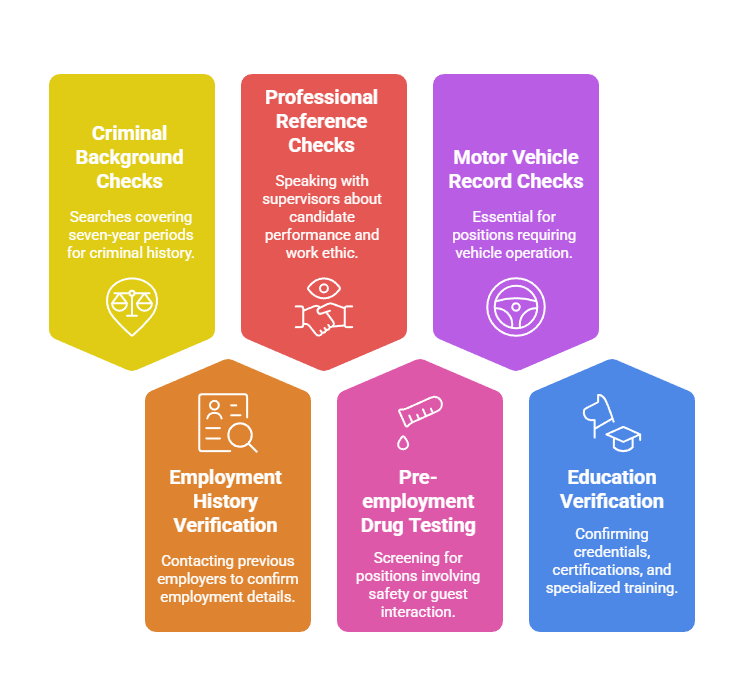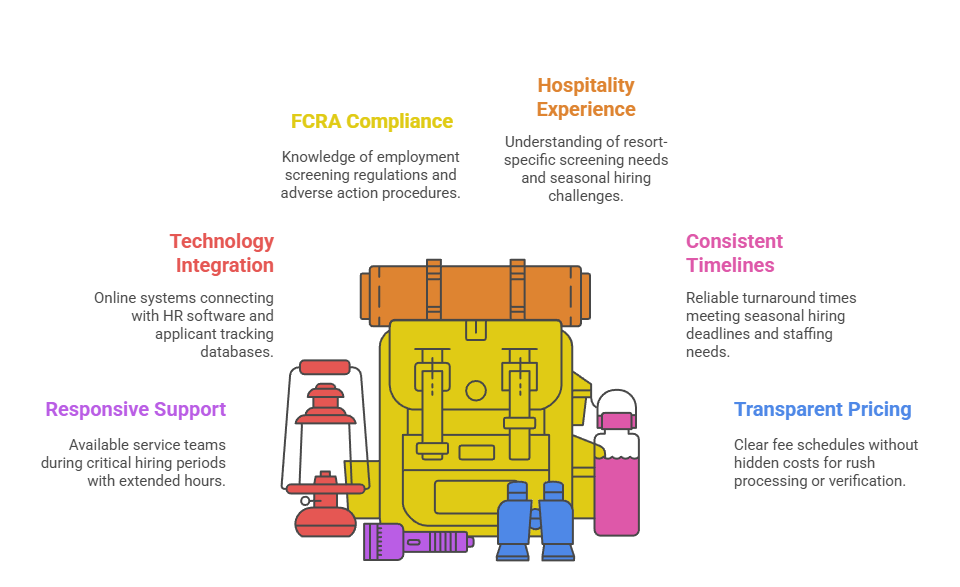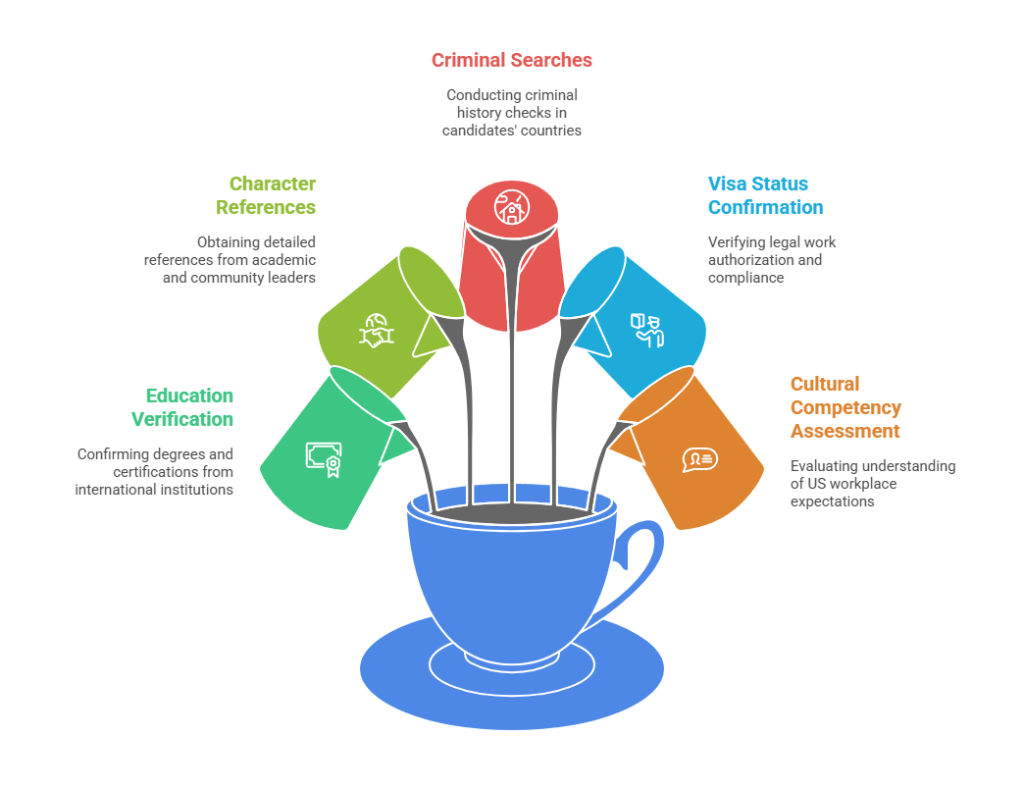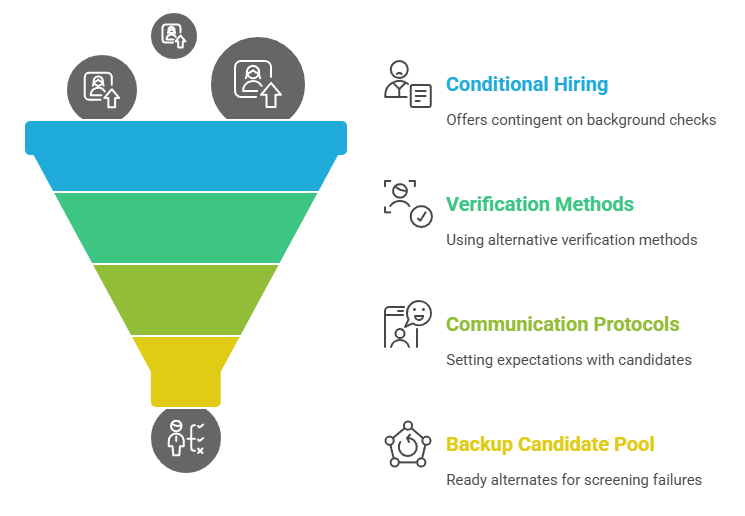Ski resort employee background checks are critical for protecting guests, reducing liability, and ensuring safe operations during winter hiring seasons. Implementing comprehensive screening programs helps resorts maintain insurance coverage while creating secure environments for families and seasonal workers.
Key Takeaways
- Comprehensive background checks should include criminal history, employment verification, and drug testing for all ski resort positions, especially those involving guest safety or equipment operation.
- Different resort positions require varying screening levels, with ski instructors and lift operators needing more thorough checks than entry-level food service workers.
- Resort employers must comply with state-specific hiring laws while balancing quick seasonal hiring needs with thorough screening processes.
- Third-party screening providers can streamline winter hiring timelines while ensuring FCRA compliance and consistent screening standards.
- Investment in proper background screening reduces insurance premiums, prevents workplace incidents, and protects resort reputation during peak season operations.
- Early screening implementation during September-November hiring windows prevents last-minute staffing shortages and ensures qualified seasonal workforce availability.
Why Ski Resorts Need Employee Background Checks
The ski resort industry faces unique staffing challenges that make employee background screening essential for safe operations. Winter seasonal hiring occurs rapidly during September through November, creating pressure to fill hundreds of positions quickly. However, resort operators must maintain safety standards throughout the hiring process.
Resort environments present numerous safety considerations that require qualified, trustworthy staff. Employees operate chairlifts and grooming equipment daily. Additionally, ski instructors teach children while other staff handle guest services and food preparation. Background checks help identify candidates with relevant experience. Furthermore, they screen out individuals with concerning criminal histories or substance abuse issues.
Insurance companies increasingly require comprehensive screening programs for resort coverage in 2025. Proper background check procedures can reduce premium costs significantly. Moreover, they ensure compliance with industry safety standards. Resorts that implement thorough screening demonstrate due diligence in hiring practices. Consequently, this approach potentially reduces liability exposure from negligent hiring claims.
The mountain hospitality sector employs over 187,000 seasonal workers annually across major ski states. These workers interact with millions of guests each winter season. Therefore, proper vetting becomes essential for maintaining guest confidence and operational integrity.
Types of Background Checks for Resort Positions
Essential Screening Components
Resort background checks should include multiple verification layers to ensure comprehensive candidate evaluation. Criminal history searches reveal convictions that might disqualify candidates from safety-sensitive positions. Similarly, employment verification confirms work experience claims and identifies performance issues at previous employers.
Core screening elements provide thorough candidate assessment across multiple areas:

- Criminal background checks: County, state, and federal searches covering seven-year periods for comprehensive criminal history review
- Employment history verification: Direct contact with previous employers to confirm dates, positions, responsibilities, and departure circumstances
- Professional reference checks: Speaking directly with former supervisors about candidate performance, reliability, and work ethic in similar environments
- Pre-employment drug testing: Required screening for positions involving equipment operation, safety responsibilities, or guest interaction duties
- Motor vehicle record checks: Essential for shuttle drivers, equipment operators, maintenance staff, and any position requiring vehicle operation
- Education and certification verification: Confirming instructor credentials, technical certifications, and specialized training from recognized organizations
Professional licensing verification ensures instructors hold current certifications from recognized organizations. Many states require specific instructor credentials for legal compliance. Therefore, verification becomes essential for meeting local regulations and insurance requirements.
Position-Specific Screening Requirements
Different resort positions require varying screening intensity based on safety responsibilities and guest interaction levels. Lift operators need comprehensive screening due to mechanical operation duties that directly affect guest safety. Meanwhile, food service workers may require less intensive screening focused on basic criminal history and employment verification.
Ski instructor background checks typically include criminal history, certification verification, and reference checks from previous teaching positions. Equipment maintenance staff require drug testing and criminal screening due to their responsibility for mechanical safety systems. Additionally, guest services personnel need thorough screening because of their access to personal guest information and payment systems.
| Position Category | Criminal Check | Drug Testing | Reference Verification | Certification Check |
| Lift Operations | Comprehensive | Required | Employment History | Safety Training |
| Ski Instruction | Standard | Recommended | Teaching References | PSIA/AASI Certification |
| Equipment Maintenance | Comprehensive | Required | Technical Experience | Mechanical Certifications |
| Guest Services | Standard | Optional | Customer Service | Hospitality Training |
| Food & Beverage | Basic | Optional | Service History | Food Safety Certification |
| Transportation | Comprehensive | Required | Driving History | Commercial License |
Position-specific requirements help allocate screening resources efficiently while maintaining appropriate safety standards. This targeted approach ensures thorough vetting for high-risk positions while streamlining processes for lower-risk roles.
Legal Compliance for Ski Resort Hiring
Resort employers must navigate federal FCRA requirements while adhering to state-specific employment laws. Colorado, Utah, California, and Vermont each maintain unique regulations regarding background check scope and timing. Understanding these legal frameworks prevents discrimination claims and ensures compliant hiring practices.
The Fair Credit Reporting Act mandates specific procedures for conducting employment background checks in 2025. These requirements include written consent forms and adverse action notifications. Resort HR teams must provide candidates with proper disclosure documents before initiating screening. Additionally, they must follow structured processes when background check results influence hiring decisions.
Ban-the-box laws in several states restrict when employers can inquire about criminal history. These regulations require resorts to delay criminal background discussions until later hiring stages. Consequently, this affects traditional screening timelines and requires adjusted hiring procedures.
State-Specific Requirements
Colorado employment laws require specific timing for background check discussions during the hiring process. Employers cannot inquire about criminal history until after determining candidate qualifications. Utah maintains different requirements for seasonal employers regarding screening timelines. California's laws include additional protections for candidates with certain types of criminal histories.
Vermont regulations focus on ensuring fair hiring practices while allowing necessary safety screening. Each state also maintains different requirements for adverse action notifications. Therefore, multi-state resort operators must develop compliant procedures for each jurisdiction where they hire seasonal workers.
Best Practices for Winter Seasonal Hiring

Timing and Planning Strategies
Successful seasonal hiring requires early planning to accommodate background check processing times. Most resorts begin serious recruitment during late August through September. This timeline allows sufficient time for screening completion before November training programs begin. Starting early prevents last-minute staffing shortages that could compromise operations during peak seasons.
Background check turnaround times vary based on screening scope and candidate history complexity. Standard criminal and employment checks typically complete within 3-7 business days. However, comprehensive packages including multiple verifications may require 10-14 days for completion.
Planning strategies should account for higher rejection rates during seasonal hiring. The temporary workforce characteristics often result in more screening issues. Therefore, budget for screening 20-30% more candidates than needed positions to ensure adequate qualified applicant pools.
Streamlined Screening Processes
Efficient screening workflows prevent bottlenecks that could delay seasonal staffing. Implementing online application systems with integrated background check ordering streamlines the entire process. Moreover, these systems maintain compliance documentation automatically while reducing administrative burden on HR staff.
Technology integration addresses processing bottlenecks by automating routine tasks effectively. Modern screening platforms offer applicant self-service portals where candidates submit information directly. This approach reduces manual data entry while providing real-time status updates to hiring managers.
Resort operators should establish clear screening priorities based on position criticality and hiring urgency. Safety-sensitive positions receive first priority for screening resources. Meanwhile, less critical positions can follow standard processing timelines without compromising overall hiring goals.
Working with Background Check Providers
Partnering with experienced screening companies helps resorts manage high-volume seasonal hiring efficiently. Professional providers offer specialized knowledge of hospitality industry requirements. They also maintain technology platforms that streamline bulk screening operations for seasonal employers.
These partnerships prove especially valuable for resorts processing hundreds of background checks within compressed timeframes. Quality providers understand the unique challenges of winter seasonal hiring. Furthermore, they offer solutions designed specifically for the hospitality industry's needs.
Provider selection should focus on FCRA compliance expertise and hospitality industry experience. Technology integration capabilities ensure seamless workflow with existing HR systems. Additionally, reliable turnaround times and responsive customer support become critical during peak hiring periods.

- FCRA compliance expertise: Demonstrated knowledge of employment screening regulations and proper adverse action procedures
- Hospitality industry experience: Understanding of resort-specific screening needs and common seasonal hiring challenges
- Technology platform integration: Online systems that connect with existing HR software and applicant tracking databases
- Consistent processing timelines: Reliable turnaround times that meet compressed seasonal hiring deadlines and staffing requirements
- Responsive customer support: Available service teams during critical hiring periods with extended hours and dedicated account management
- Transparent pricing structures: Clear fee schedules without hidden costs for rush processing or additional verification services
Quality providers offer comprehensive packages designed specifically for seasonal employers. These services include volume discounts and expedited processing options that help manage costs effectively.
Cost Considerations and ROI Analysis
Background check investments provide significant returns through reduced liability and lower insurance premiums. Screening costs typically range from $25-75 per candidate depending on package scope. However, this expense represents minimal investment compared to potential risks from inadequate hiring practices.
Insurance premium reductions often offset screening costs entirely. Many carriers offer discounts for employers implementing thorough background check procedures. These discounts recognize reduced claim risks from proper hiring practices. Additionally, workers' compensation rates may decrease when employers demonstrate commitment to safety through comprehensive screening programs.
Long-term benefits include enhanced resort reputation and guest loyalty from consistent service quality. Guests notice when staff members are professional, reliable, and properly trained. This recognition contributes to positive reviews and repeat business throughout multiple seasons.
ROI calculation should include direct cost savings from insurance premium reductions and workers' compensation discounts. Risk mitigation value includes avoided legal fees, settlement costs, and reputation damage from hiring incidents. Operational efficiency improvements result from reduced turnover and training costs through better candidate selection.
Screening International Seasonal Workers
International seasonal workers present additional screening complexities due to limited criminal history availability. Many J-1 visa holders have minimal US employment history, requiring alternative verification methods. Additionally, employment verification difficulties arise from international employer contact challenges and time zone differences.
Developing specialized procedures for international candidates ensures consistent evaluation standards. These procedures accommodate documentation limitations while maintaining screening effectiveness. Alternative verification methods include education record reviews and international reference checks from previous employers or academic institutions.
Background check providers experienced with international screening can navigate these challenges effectively. They maintain relationships with international verification services and understand documentation requirements for various countries. Moreover, they provide guidance on acceptable alternative screening methods that maintain compliance standards.

- Education verification focus: Confirming degrees, certifications, and training credentials from international institutions when employment history is limited
- Character references: Obtaining detailed references from academic advisors, internship supervisors, or community leaders in candidates' home countries
- International criminal searches: Conducting available criminal history checks in candidates' countries of origin and residence
- Visa status confirmation: Verifying legal work authorization and compliance with J-1 program requirements and restrictions
- Cultural competency assessment: Evaluating candidates' understanding of US workplace expectations and guest service standards through interviews
These adapted screening approaches ensure international candidates receive fair evaluation while maintaining safety and quality standards.
Common Challenges and Solutions
Resort employers frequently struggle with balancing thorough screening against rapid hiring needs. Traditional background check processes may seem incompatible with seasonal hiring urgency. However, streamlined procedures and early planning can address these challenges effectively without compromising safety standards.
High-volume screening during peak recruitment periods creates administrative bottlenecks. Processing hundreds of applications simultaneously strains HR resources and screening provider capacity. Technology solutions and bulk processing arrangements help manage these volume challenges while maintaining consistent screening quality.
Challenge mitigation requires proactive planning and flexible screening procedures. Early recruitment initiation during August allows adequate screening time before operational deadlines. Volume agreements with providers reduce costs and processing times through dedicated resources during peak periods.

- Conditional hiring procedures: Making preliminary job offers contingent on successful background check completion to maintain candidate engagement
- Alternative verification methods: Using education records and international references when traditional employment history is unavailable or incomplete
- Clear communication protocols: Setting realistic expectations with candidates about screening requirements, timelines, and potential delays
- Backup candidate pools: Maintaining qualified alternate candidates to quickly fill positions if primary choices fail screening requirements
These solutions help maintain hiring momentum while ensuring thorough candidate evaluation throughout the screening process.
Technology and Automation in Screening
Modern screening technology significantly improves efficiency during high-volume seasonal hiring periods. Automated systems handle routine tasks like candidate communication and status updates. Meanwhile, HR staff can focus on complex screening decisions and candidate evaluation activities.
Online platforms provide real-time screening status updates to hiring managers and candidates alike. This transparency reduces administrative burden while improving candidate experience during the screening process. Additionally, automated adverse action notifications ensure FCRA compliance without manual tracking requirements.
Integration with applicant tracking systems creates seamless workflows from application to final hiring decision. Candidates can complete screening authorization forms electronically while hiring managers track progress automatically. These technological improvements reduce processing time while maintaining accuracy and compliance standards.
Mobile-friendly screening platforms accommodate candidates applying from various devices and locations. This accessibility becomes particularly important for seasonal workers who may not have regular computer access. Furthermore, mobile optimization improves application completion rates and reduces hiring timeline delays.
Measuring Screening Program Success
Effective screening programs require ongoing measurement to ensure optimal performance and return on investment. Key performance indicators include screening completion times, candidate rejection rates, and post-hire incident rates. Regular analysis of these metrics identifies improvement opportunities and validates screening effectiveness.
Tracking insurance claim reductions and premium changes provides concrete ROI evidence for screening investments. Resort operators should document safety incidents, workers' compensation claims, and guest complaints related to employee performance. This data demonstrates screening program value while identifying areas for enhanced evaluation procedures.
Post-hire performance tracking correlates screening results with employee success rates. Employees who pass comprehensive screening typically demonstrate better job performance and longer tenure. Moreover, they generate fewer disciplinary actions and guest complaints throughout the season.
| Metric Category | Key Performance Indicators | Target Benchmarks |
| Processing Efficiency | Average completion time, candidate response rates | Under 7 days, 95% completion |
| Quality Outcomes | Rejection rates, false positive rates | 15-25% rejection, Under 5% false positives |
| Business Impact | Insurance premium changes, incident rates | 10%+ premium reduction, 50%+ incident reduction |
Regular program evaluation ensures screening procedures remain effective while identifying cost reduction opportunities and process improvements.
Conclusion
Implementing comprehensive ski resort employee background checks protects guests, reduces liability exposure, and ensures qualified seasonal workforce availability. Early planning and strategic partnerships with experienced screening providers help resorts manage high-volume winter hiring while maintaining consistent safety standards. The investment in proper background screening delivers significant returns through reduced insurance costs, improved workplace safety, and enhanced guest satisfaction. Resort operators who prioritize thorough screening establish competitive advantages through superior service quality and operational reliability during peak seasons.
Frequently Asked Questions
How long do ski resort background checks typically take to complete?
Standard ski resort background checks usually take 3-7 business days for basic criminal and employment verification, while comprehensive packages may require 10-14 days depending on the scope of screening and candidate history complexity.
What disqualifies someone from working at a ski resort?
Disqualifying factors typically include violent felony convictions, drug-related offenses, theft charges, or failed drug tests, especially for safety-sensitive positions like lift operators or equipment maintenance roles.
Are background checks required for all ski resort positions?
While not legally mandated for all positions, most reputable ski resorts conduct background checks for safety-sensitive roles, guest-facing positions, and any job involving equipment operation or supervision of minors.
How much do ski resort employee background checks cost?
Background check costs typically range from $25-75 per candidate depending on the screening package scope, with volume discounts available for seasonal hiring periods when resorts process hundreds of applications.
Can international seasonal workers pass US background checks?
International workers can undergo modified screening procedures focusing on available records, education verification, and international references, though limited US criminal history may require alternative evaluation methods.
Do ski resorts check driving records for all employees?
Driving record checks are typically required only for positions involving vehicle operation, such as shuttle drivers or equipment operators, rather than for general resort staff positions.
How early should resorts start background checks for seasonal hiring?
Resorts should begin background check processes during September-October hiring periods to allow adequate processing time before November training programs and December operations begin.
What happens if a background check reveals concerning information?
Employers must follow FCRA adverse action procedures, providing candidates with pre-adverse action notices, copies of background reports, and opportunities to dispute findings before making final hiring decisions.
Additional Resources
- Fair Credit Reporting Act Compliance Guide for Employers
https://www.ftc.gov/business-guidance/resources/using-consumer-reports-what-employers-need-know - National Ski Areas Association Employment Resources
https://www.nsaa.org/NSAA/Industry/Resources/Employment_Resources/ - Professional Ski Instructors of America Certification Requirements
https://www.thesnowpros.org/education-programs/ - EEOC Background Check Guidelines for Employers
https://www.eeoc.gov/newsroom/eeoc-issues-enforcement-guidance-consideration-arrest-and-conviction-records-employment - State-by-State Employment Law Guide for Seasonal Employers
https://www.dol.gov/agencies/whd/state/contacts - Hospitality Industry Background Screening Best Practices
https://www.ahla.com/resource/hospitality-hiring-best-practices
